An example of method in prayer (Augustine and Luther)
length: 70:24 - taught on Oct, 13 2022
Class Outline:
Thursday October 13, 2022
I want to first temper this lesson with the statement that I do not hold to the words or ways of men as having the authority of Scripture, no matter how great they are as thinkers of theologians. However, learning from others is very fruitful as long as they are communicating the truth from the Scripture. They bring to us years of learning and experience that we haven’t invested and have learned the truth to a level of understanding that they can present it in their own way, a way (not a different truth) that we have perhaps not thought of.
I should also say that I don’t agree with everything that these great theologians have written. But I am glad to know what I do of them, for as my teachers I have learned truth and I have also seen how biases and experiences in their lives led them, in some of their own doctrines, to venture outside of the revealed Scripture.
When I came across the literature on these two letters, one from Augustine and the other from Martin Luther, I sighed, not expecting much, but kept on reading. I was pleasantly surprised and have applied some of their method with great success. So, I want to share it with you.
Prayer is the continuation of a conversation that God has started based on His character, revealed in His word, to which we are reaching toward.
Theology of prayer - the character of prayer is determined by the character of God we are reaching toward. He is triune: to the loving Father, through the mediation of the Son given to us, by the power of the Spirit who indwells us.
Practical advice on prayer can be found in a lot of volumes. In one particular work, the author highlighted Augustine, Luther, and Calvin. Augustine of Hippo (354 - 430 A.D.). He is considered the doctor of the church to the Catholic church but his works also greatly influenced the reformers.
What we know about his view on prayer is found in a letter to a friend who was struggling to pray.
Augustine’s first principle - before you know what to pray for and how to pray for it, you must become a certain kind of person.
Augustine principle 1) get your heart’s loves in order.
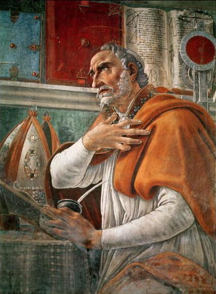
“You must account yourself ‘desolate’ in this world, however great the prosperity of your lot may be.”
We must see that our heart’s loves are “disordered,” out of order. Things we ought to love third or fourth are first in our hearts. God, whom we should love supremely, is someone we may acknowledge but whose favor and presence is not existentially as important to us as prosperity, success, status, love, and pleasure.
For example, if we look to our financial prosperity as our main source of safety and confidence in life, then when our wealth is in grave jeopardy, we will cry out to God for help, but our prayers will be little more than “worrying in God’s direction.” When our prayers are finished we will be more upset and anxious than before. Prayer will not be strengthening.
2) Now you can begin to pray. For what? “Pray for a happy life.”
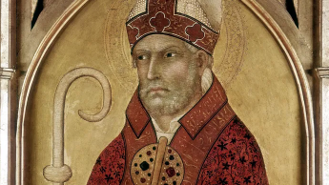
What however, will bring you a happy life? This then goes back to his first principle. Put God first, your first love, and realize that comforts and rewards and pleasures in themselves only give fleeting excitement and happiness. He turns to:
One thing I have asked from the Lord, that I shall seek:
That I may dwell in the house of the Lord all the days of my life,
To behold the beauty of the Lord,
And to meditate in His temple.
I will add:
“Martha, Martha, you are worried and bothered about so many things; but only one thing is necessary, for Mary has chosen the good part,”
This is the fundamental prayer for happiness from a mind that the Spirit has cleansed of illusions. “We love God, therefore, for what He is in Himself, and [we love] ourselves and our neighbors for His sake.”
He then cites:
Two things I asked of Thee,
Do not refuse me before I die:
8 Keep deception and lies far from me,
Give me neither poverty nor riches;
Feed me with the food that is my portion,
9 Lest I be full and deny Thee and say, "Who is the Lord?"
Or lest I be in want and steal,
And profane the name of my God.
This is essentially the same thing as to pray, “Give us today our daily bread.” But you must understand what it means. It means more than getting bread. Indeed, God has given us sustenance without us asking for it.
If our heart’s loves are out of order, your prayer’s intention will be, “Make me as wealthy and comfortable as possible.” But looking again at God’s wisdom book, “Don’t give me so much that I will deny You and don’t give me too little that I will be in want and steal.”
Ultimately, we don’t need things, we need the Lord (His presence in our everyday life). Like Martha, we easily get so distracted and think the wrong things are the most important. Then we start concluding that the reason we are miserable is because the oven won’t heat evenly, the store was out of carrots because of supply chain issues (then we blame the dems), our money is too tight and we can’t afford the best ingredients because we spent everything on gas (and then we blame the dems), and for God sakes Jesus, Mary won’t help at all!
Because you made the wrong things important; you gave them your love instead of dedicating it to God where it should be, you naturally concluded that they were the source of your misery. The problem isn’t the oven or the carrots or the gas or Mary. It’s you!
Shakespeare wrote: “The fault, dear Brutus, is not in our stars, but in ourselves” (Julius Caesar, Act 1, Scene 2). [says Cassius to Brutus]
What we have in the Lord is infinitely more valuable and the reality of what we have in the Lord is the only source of true happiness.
This is why in the Lord’s prayer we don’t get to the petition for our daily needs until we have spent time remembering the greatness of God and His plan.
Augustine’s third directive is both comprehensive and practical.
3) Study the Lord’s Prayer.

Once you have made yourself aware of the disordered state of your heart and determined where true joy is found, you can be guided into the specifics of how to pray by studying the Lord’s prayer.
There is no place in the Lord’s prayer to fit selfish pursuits.
4) Prayer during difficult times inevitably becomes confusion. Should we ask for it to stop or for the strength to soldier on.

Do we pray for the tribulation to be removed or for strength to endure it? We know that tribulation will do us good, but because they are hard and painful, and we are not ascetics, we pray for relief.
Augustine points to Jesus’ prayer in Gethsemane, which was perfectly balanced between honest desire - “Let this cup pass from Me” - and submission to God - “Nevertheless, not My will but Yours be done.” He adds from Rom 8 that we also have the Holy Spirit who helps our weakness in prayer.
Martin Luther (1483-1546) is considered the father of the Reformation. He wasn’t the first reformer but he was the first very influential one.
His most famous writing on prayer was also in the form of a letter to a friend. Luther was known to devout three hours a day to prayer.
Luther 1) Make prayer a habit, first in the morning and last at night.
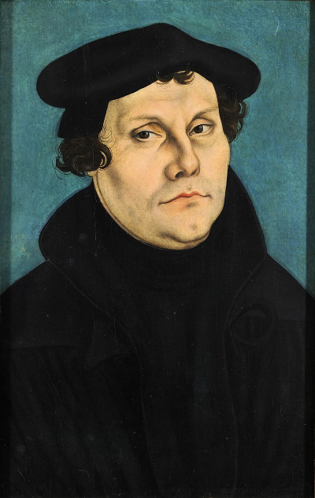
First, Luther counsels the cultivation of prayer as a habit through regular discipline, proposing twice daily.
“It is a good thing to let prayer be the first business of the morning and the last at night. Guard yourselves against those false, deluding ideas which tell you, ‘Wait a little while. I will pray in an hour; first I must attend to this or that.’”
He is not being a romantic, but concludes “We are as strictly and solemnly commanded to pray as in the others … not to kill, not to steal, etc.”
We must pray whether we feel like it or not.
2) Focus and warm our thoughts and affections to God through meditation on Scripture.

Luther proposes ways to focus our thoughts and to warm and engage our affections for prayer. This is a balancing truth to that of prayer as a duty. We should engage in prayer even when we don’t feel like it, but we should also do everything we can to make it effective by warming our hearts to commune with God.
Luther advises what he calls, “recitation to yourself” of some part of the Scripture in the form of meditation. It is not Bible study, but taking the words of Scripture and pondering them in a way that your thoughts and feelings converge on God. Meditation on Scripture is a sort of bridge from distractions of life to focus on God.
Meditation: Pick a passage
Instruction - find its revealed truth.
Thanksgiving - all truth is a gift.
Confession - have we lived up to it.
Prayer - speak plainly about it.
After advising meditation, Luther then describes how to do it. What does the passage want us to believe or do? We have to understand what we are meditating on. Then seek your own thanksgiving for the gift of God in the truth the passage states. Then examine yourself in light of that truth, which will lead to some honest confession of not fully living up to its heavenly standard. Then talk to God about the passage and its truth in prayer, which could lead you to many different aspects of truth, God, yourself, or your relationship to God.
What Luther is trying to do is to get past the theoretical Word of God and to the actual believing and doing that draws us close to God in a serious manner. And whether anyone adopts his method or not, what he is trying to do we must all do.
A great benefit to this, if you practice it over time, is that over time this meditative habit will often exert itself during the day, naturally turning your heart toward God. You may find many things you hear, see, and read spontaneously leading you to repent, and to praise and petition God. It helps you to habitually put God into every picture, seasoning your feelings and thoughts, lifting you up when disappointed, and humbling you when successful.
He gives an example of his meditation on the first commandment:
“I am the Lord your God, who brought you out of the land of Egypt, out of the house of slavery.
You shall have no other gods before Me.”
“Here I earnestly consider that … my heart must not build upon anything else or trust in any other thing, be it wealth, prestige, wisdom, might, piety, or anything else. Second, I give thanks for His infinite compassion by which He has come to me in such a fatherly way and, unasked, unbidden, and unmerited, has offered to be my God, to care for me, and to be my comfort, guardian, help, and strength in every time of need … Third, I confess … for having fearfully provoked His wrath by countless acts of idolatry. I repent of these and ask for His grace. Fourth, I pray … preserve my heart so that I shall never again become forgetful or ungrateful, that I may never seek after other gods or other consolation on earth or in any creature, but cling truly and solely to Thee, my only God.”
It’s not exactly Bible study, nor is it exactly prayer. It is meditation.
Still, Luther doesn’t pray yet.
3) Pray the Lord’s Prayer, paraphrasing and personalizing.
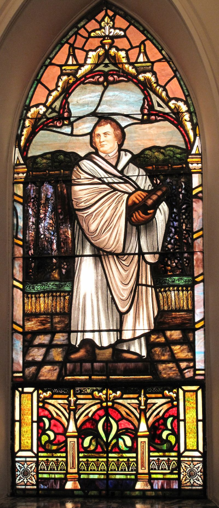
He suggests that next we should pray through the petitions of the Lord’s prayer, paraphrasing and personalizing each one using your own needs and concerns. He gives his own example, but he is adamant that reader of his essay not recite the actual words that he uses. Himself, he doesn’t not speak the prayer the same way the following day.
This addresses one of the great practical difficulties of prayer - distracting thoughts.
In our own prayers we are easily led astray to other people and events that pop into our minds as we are seeking God for something or other. Meditation and then staying in the confines of the Lord’s prayer forces us to focus on God our Father, His holiness, His heaven, His kingdom and His will, and then for us, just what we need, His forgiveness daily of our sins and our required forgiveness of all others and then the path through the day not falling into the snares of the devil.
Each one of the petitions in the Lord’s Prayer would have application to hundreds of our own needs and concerns.
For instance, when we request forgiveness we are claiming God’s grace, knowing that through the cross of Christ we are forgiven, and that every day in real time we have been adding to our debt that Christ thankfully paid. We cannot therefore forget that we are sinners forgiven hundreds or thousands of times a day (we could never know how many). This also makes us aware of patterns of sins as well as sins that we have locked away in our subconscious mind that need to be dealt with in God’s light for greater spiritual health, and which we would rather not.
Forgive our debtors addresses the resentments and grudges that are also robbing us of spiritual health.
We are forced in the Lord’s prayer to thank God our Father even in our dark times and also to thank Him for our prosperous times so we don’t forget the Giver. It disciplines us in every part of our lives.
If left to ourselves we are likely to pray only about the items that trouble us most at the moment.
Then, Luther would pray from the heart. His mind so focused by meditation and the Lord’s prayer.
4) Now pray to the Father from your own heart.
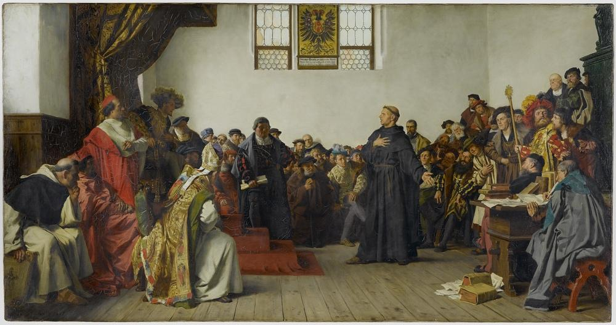
It has seemed like a lot, but the whole exercise (not following dear Martin’s exact procedure, but fruitfully making your own like it) can take ten or fifteen minutes. A few minutes in meditation and a few minutes in the Lord’s prayer, and a few minutes for your own prayers, which would be altered from what they would have been if you launched right into them. You still have time for breakfast and coffee. However, you will find at times that this time in deep concentration in communion with God will catch fire and perhaps last a while. You will learn to love it and cherish it and guard it from distraction.
And…) Be on the lookout for direct teaching from the Holy Spirit at every step.
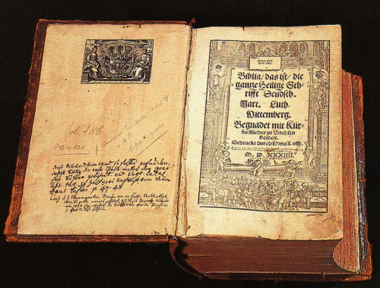
Luther gives one more piece of advice. It is not another step but something that goes along with the others. He calls praying believers to essentially keep a lookout for the Holy Spirit.
If we are meditating or praying, “an abundance of good thoughts comes to us, we ought to disregard the other petitions, make room for such thoughts, listen in silence, and under no circumstances obstruct them. The Holy Spirit Himself preaches here, and one word of His sermon is better than a thousand of our prayers. Many times I have learned more from one prayer than I might have learned from much reading and speculation.” Further, he writes, “If in the midst of such thoughts the Holy Spirit begins to preach in your heart with rich, enlightening thoughts, honor Him by letting go of this written scheme … Remember what He says and note it well and you will behold wondrous things in the law of God” (PSA 119:18).
Open my eyes, that I may behold
Wonderful things from Your law.
The balance exhibited by this final point is seldom found in works on prayer. But this is not the mistake of thinking God’s impressions are outside of Scripture. God’s communication to us is in the Scripture. Whatever the Spirit preaches to us will be found in the confines of biblical truth - but as your Teacher, the Holy Spirit is fashioning the lesson in a way that gives you the best opportunity for understanding.





